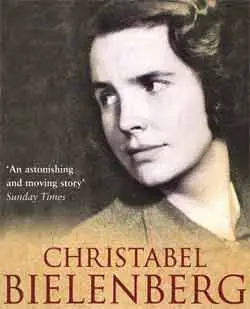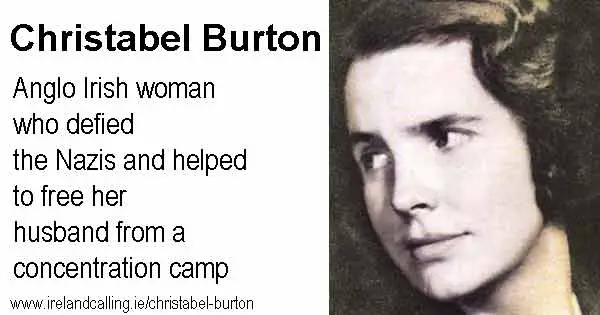Christabel Burton was an Anglo-Irish woman who defied the Nazis during World War II by outsmarting interrogators to help free her husband from a concentration camp prison.
She later set up a fund for families who opposed the Nazis and also spent much of her life confronting holocaust deniers.
Burton, whose mother was from Corofin in Co Clare, was named after the suffragette Christabel Pankhurst. She was brought up in London and married a German lawyer named Peter Bielenberg in 1934.
Burton took German citizenship which meant that she had to give up her British citizenship. As she handed in her British passport a German embassy official warned her that she had not made a good exchange.
Bielenberg and Burton moved to Germany after they had got married. Burton was a music student in Hamburg. She was training to be an opera singer and sang with Irish tenor John McCormack, one of the major opera stars of the day.
Bielenberg was not allowed to practise law in Germany because he had refused to join the Nazi party. He volunteered to join the army. However, he and Burton were so disgusted by Kristallnacht in 1938, when jewish shops and businesses were attacked and looted by Nazi mobs, that they decided to leave Germany and live in Ireland.
They changed their mind and decided to remain in Germany after their friend Adam von Trott zu Solz convinced them that it was their ‘patriotic duty’ to stay and fight Nazism. Von Trott had wanted the Germans themselves to stop Hitler. He flew to London to try to persuade the British leaders to delay an attack on Germany.
He believed that the German people would be more likely to back Hitler if the country was under attack. However, it was too late as the British were ready for war and there was no turning back.
Bielenberg, von Trott and another man, Fritz-Dietlof Graf von der Schulenburg, had some involvement in a failed plot to assassinate Adolf Hitler.
The plan had been to kill the Nazi leader with a briefcase bomb on 20 July 1944. The part that von der Schulenburg and Bielenberg played in the plot was only publically acknowledged for the first time at Ireland’s first Holocaust Memorial Day commemoration in January 2003.
When the plot failed von der Schulenburg was arrested and in August 1944, he was tried and hanged from meat hooks.
Bielenberg and Burton continued to associate with anti-Nazi groups. Eventually Bielenberg and von Trott were arrested by the Gestapo.
 Burton had Nazi acquaintances who were able to pull some strings so that she was able to visit her husband at Ravensbruck concentration camp.
Burton had Nazi acquaintances who were able to pull some strings so that she was able to visit her husband at Ravensbruck concentration camp.
During the visit the couple clasped hands which gave Bielenberg a chance to give Burton a seemingly unremarkable matchbox. However, the matchbox contained information that he wanted to pass on to his wife.
He had told her all of the cover stories that he had told his interrogators since he had been arrested.
Once Burton knew what Bielenberg had told the Gestapo she was able provide him with alibis that confirmed what he had said.
She went to the Gestapo headquarters and demanded to be interviewed. The interview was tense and hostile. Burton was short-sighted, which helped her convey powerful body language in the circumstances. She was able to outstare the Gestapo officer who was interviewing her.
During the interview, Burton used the stories that her husband had given to her. She also played on her Irish roots and her family links with the press baron, Lord Rothermere, who had once been a Nazi sympathiser.
Following, Burton’s interview, Bielenberg was released to an army punishment camp. He managed to avoid the punishment camp due to an administrative error and went to live with his family in the Black Forest.
After the war, Bielenberg and Burton returned to Ireland and lived on a farm in Co Carlow. Two of their sons married two of the daughters of von der Schulenburg.
Burton set up a fund to help the families of the Resistance to Hitler. The 20th July Memorial Fund was set up to support the children of Nazi opponents who had been killed during the war. It captured the imagination of the public who gave generously to the fund.
She also refused to allow Holocaust deniers to misrepresent the horrific actions of the Nazis during the war and would often confront them.
Burton released her autobiography, The Past Is Myself, in 1968. It was translated into seven languages sold half a million copies. It was also made into a TV drama titled ‘Christabel’ by the BBC, featuring Elizabeth Hurley.
Bielenberg and Burton lived in Ireland for the rest of their lives. Bielenberg died in 2001 and Burton died in 2003.
More history articles
The Neolithics – first people to leave their mark on Ireland
